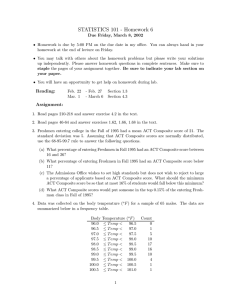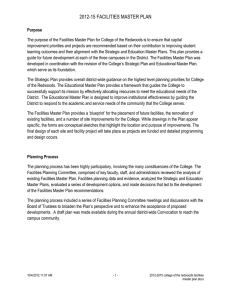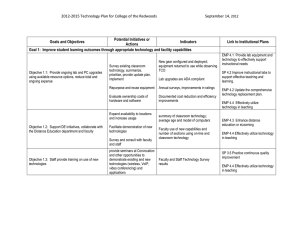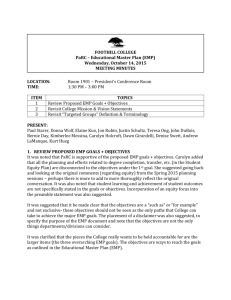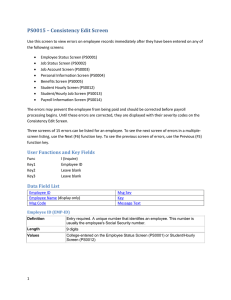DRAFT -- FOR DISCUSSION ONLY 2012-13 UPDATED FACILITIES MASTER PLAN
advertisement
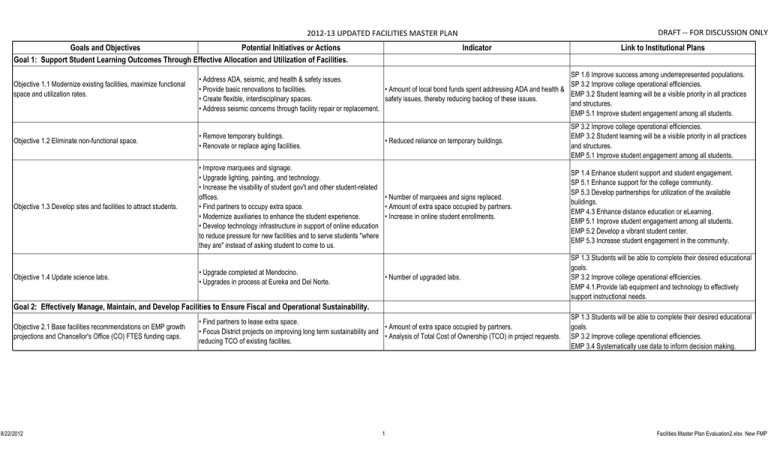
DRAFT -- FOR DISCUSSION ONLY 2012-13 UPDATED FACILITIES MASTER PLAN Goals and Objectives Potential Initiatives or Actions Goal 1: Support Student Learning Outcomes Through Effective Allocation and Utilization of Facilities. Objective 1.1 Modernize existing facilities, maximize functional space and utilization rates. Indicator Link to Institutional Plans SP 1.6 Improve success among underrepresented populations. • Address ADA, seismic, and health & safety issues. SP 3.2 Improve college operational efficiencies. • Provide basic renovations to facilities. • Amount of local bond funds spent addressing ADA and health & EMP 3.2 Student learning will be a visible priority in all practices • Create flexible, interdisciplinary spaces. safety issues, thereby reducing backog of these issues. and structures. • Address seismic concerns through facility repair or replacement. EMP 5.1 Improve student engagement among all students. SP 3.2 Improve college operational efficiencies. EMP 3.2 Student learning will be a visible priority in all practices and structures. EMP 5.1 Improve student engagement among all students. Objective 1.2 Eliminate non-functional space. • Remove temporary buildings. • Renovate or replace aging facilities. Objective 1.3 Develop sites and facilities to attract students. • Improve marquees and signage. • Upgrade lighting, painting, and technology. • Increase the visability of student gov't and other student-related • Number of marquees and signs replaced. offices. • Find partners to occupy extra space. • Amount of extra space occupied by partners. • Modernize auxiliaries to enhance the student experience. • Increase in online student enrollments. • Develop technology infrastructure in support of online education to reduce pressure for new facilities and to serve students "where they are" instead of asking student to come to us. SP 1.4 Enhance student support and student engagement. SP 5.1 Enhance support for the college community. SP 5.3 Develop partnerships for utilization of the available buildings. EMP 4.3 Enhance distance education or eLearning. EMP 5.1 Improve student engagement among all students. EMP 5.2 Develop a vibrant student center. EMP 5.3 Increase student engagement in the community. • Upgrade completed at Mendocino. • Upgrades in process at Eureka and Del Norte. SP 1.3 Students will be able to complete their desired educational goals. SP 3.2 Improve college operational efficiencies. EMP 4.1.Provide lab equipment and technology to effectively support instructional needs. Objective 1.4 Update science labs. • Reduced reliance on temporary buildings. • Number of upgraded labs. Goal 2: Effectively Manage, Maintain, and Develop Facilities to Ensure Fiscal and Operational Sustainability. Objective 2.1 Base facilities recommendations on EMP growth projections and Chancellor's Office (CO) FTES funding caps. 8/22/2012 • Find partners to lease extra space. • Amount of extra space occupied by partners. • Focus District projects on improving long term sustainability and • Analysis of Total Cost of Ownership (TCO) in project requests. reducing TCO of existing facilites. 1 SP 1.3 Students will be able to complete their desired educational goals. SP 3.2 Improve college operational efficiencies. EMP 3.4 Systematically use data to inform decision making. Facilities Master Plan Evaluation2.xlsx New FMP DRAFT -- FOR DISCUSSION ONLY 2012-13 UPDATED FACILITIES MASTER PLAN Goals and Objectives Potential Initiatives or Actions Indicator Objective 2.2 Align program investments and outcomes to long term funding. • Consolidate or combine related programs. • Maintain program competitiveness relative to CTE industry or community college peer data. • Increase distance learning and community education by improving technology and other infrastructure. • Number of program consolidations. • Increase in online student enrollments. Objective 2.3 Improve efficiency while continuing to position the District to receive state funding. • Prioritize state bond project requests that address existing facility needs first. • Allocate local bond funds to maximize matching dollars. • Promote priorities and projects that result in lower total cost of ownership, encourage long term sustainability, and earn LEED, Energy Star or related sustainability recognition. • Provide for aggressive pursuit of matching dollars, rebates and incentives. • Amount of new state bond allocations. • Analysis of Total Cost of Ownership (TCO) in project requests. • Amount of Bond funds spent on energy efficiency. • Currently approved state infrastructure bond fundings gets allocated to the District for projects. Link to Institutional Plans SP 1.3 Students will be able to complete their desired educational goals. SP 2.1 Provide workforce development training. SP 3.1 Reduce reliance on apportionment-based funding. SP 3.2 Improve college operational efficiencies. SP 4.3 CTE programs will have technology relevant to their disciplines. EMP 2.1 Enhance community education program. EMP 4.3 Enhance distance education or eLearning. SP 3.1 Reduce reliance on apportionment-based funding. SP 3.3 Increase funding available for strategic initiatives. EMP 3.4 Systematically use data to inform decision making. Goal 3: Promote Best Practices For Facility Sustainability and Low Total Cost of Ownership. Objective 3.1 Prioritize the enhancement of the student learning environment in all capital outlay projects. Objective 3.2 Incorporate sustainable design principles in all development. Minimize the negative long-term effect on the environment. 8/22/2012 Incorporate a bulleted list of Themes into all contracts with architects and planners: • Make and document decisions that enhance the student learning environmenet at every step of the project from initial planning to final project closeout. • Incorporate student learning oriented best practices in facility projects as supported by evidence. Incorporate a bulleted list of Themes into all contracts with architects and planners: • Provide long term sustainability driven by lowest total cost of ownership. • Obtain LEED and/or Energy Star certifications or conform plans to meet those specifications. • Address progam needs. • Maximize reuse of existing facilities, furniture, equipment, and technology and use renewable resources. • Encourage sustainable behaviors, for example bike racks, bus shelters, low flow toilets, passive lighting, reduced waste stream, reduced noise & light pollution, etc. • District adopts a practice of incorporating a bulleted list of Sustainability and TCO Themes into all contracts with architects and planners. SP 1.4 Enhance student support and student engagement. SP 3.1 Reduce reliance on apportionment-based funding. SP 3.2 Improve college operational efficiencies. EMP 5.2 Develop a vibrant student center. • District adopts a practice of incorporating a bulleted list of Sustainability and TCO Themes into all contracts with architects and planners. SP 3.1 Reduce reliance on apportionment-based funding. SP 3.2 Improve college operational efficiencies. EMP 5.2 Develop a vibrant student center. 2 Facilities Master Plan Evaluation2.xlsx New FMP DRAFT -- FOR DISCUSSION ONLY 2012-13 UPDATED FACILITIES MASTER PLAN Goals and Objectives Objective 3.3 Consider life cycle costs and reduce maintenance needs. Potential Initiatives or Actions Indicator Incorporate a bulleted list of Themes into all contracts with architects and planners: • Facility design driven by lowest total cost of ownership. • District adopts a practice of incorporating a bulleted list of • Conform ADA plans to current codes. Sustainability and TCO Themes into all contracts with architects • Maximize energy efficiency. and planners. • Obtain comprehensive, multiyear warranties for all materials and labor provided. Link to Institutional Plans SP 3.1 Reduce reliance on apportionment-based funding. SP 3.2 Improve college operational efficiencies. EMP 5.2 Develop a vibrant student center. Goal 4: Develop Facilities to Enhance the Learning Environment, Raise the Institutional Profile, and Enhance Community Connections. Objective 4.1 Modernize the District's auxiliary and community facilities. Objective 4.2 Install a sewer main to eliminate on-site waste treatment plant. • Renovate existing residence halls, dining hall, bookstore, and community facilities to address basic maintenance needs Districtwide. • Reconfigure residence halls to promote a collaborative learning environment. • Enhance stadium and fields and gym to attract youth, K-12 and community partners. • Partner with regional wastewater district to install several miles of sewer main to service the Eureka campus and communities in between. • Eliminate the on-site waste treatment which is uncommon among California's community colleges. • Eliminate on-site waste water treatment which results in higher operating costs and increased risk of a waste spill. • Capital outlay dollars spent on auxiliary and recreational facilities, with a reasonable split between District centers and sites. • Increased partnerships for auxiliary facilities. SP 3.1 Reduce reliance on apportionment-based funding. SP 3.2 Improve college operational efficiencies. EMP 5.2 Develop a vibrant student center. • Capital outlay dollars spent on sewer main. • Cooperation among many community partners. • Identification of an outside funding source and analysis of revenue streams and TCO in support of the project. SP 3.1 Reduce reliance on apportionment-based funding. SP 3.2 Improve college operational efficiencies. SP 3.3 Increase funding available for strategic initiatives. SP 3.4 Increase community support for the college. SP 5.1 Enhance support for the college community. SP 5.7 Increase public support for the college. Abbreviations: ADA: Americans With Disabilities Act CO: Chancellor's Office CTE: Career and Technical Education EMP: Education Master Plan LEED: Leadership in Energy and Environmental Design SP: Strategic Plan TCO: Total Cost of Ownership 8/22/2012 3 Facilities Master Plan Evaluation2.xlsx New FMP
